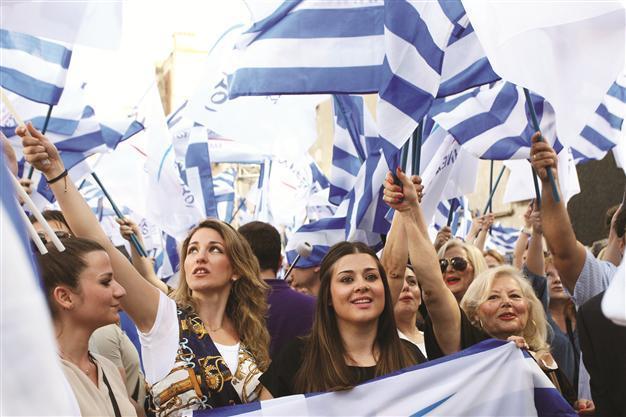Greek parliamentary elections may further rock shaky Europe
Luke Baker - Brussels / Reuters

Supporters of the right wing party ‘Independent Greeks’ wave flags during a speech of the party’s leader Panos Kammenos at an election rally ahead of the May 6 parliamentary elections in Thessaloniki. AFP photo
Overshadowed by the prospect of a Socialist win in France’s presidential vote, the parliamentary election in
Greece this weekend carries far greater risks for the eurozone.
Opinion polls show no clear winner emerging from the vote, with the two main parties - centre-right New Democracy and PASOK’s socialists - together garnering around 38 percent of the ballot, barely enough for a parliamentary majority under Greece’s electoral system.
Either they will secure just enough to work as together, albeit uncomfortably and with a very slim majority, or steps will have to be taken to form a broad coalition with minor parties firmly opposed to the European Union’s austerity measures.
That in turn will increase the pressure on the new government to renegotiate parts of the second bailout program, an ambitious deal struck in February that aims to clear the way for Greece to return to financial markets by 2015.
Some economists take the view that election could push Greece back to the nadir it touched in November last year, when there was widespread talk of an exit from the eurozone. The contagion effect would drive Spanish and Italian bond yields straight back into the danger zone, economists say.
“Political paralysis in Greece following the elections could lead to a default and even threaten a euro exit, in our view,” Bank of America strategist Athanasios Vamvakidis wrote in a research paper.
“We believe that the troika may have little choice but to stop funding Greece if there is no government in place,” he said, referring to the monitoring mission made up of the European Central Bank, the IMF and the European Commission.
While others are less apocalyptic, there is a widespread expectation among private-sector analysts that some renegotiation of the second program will be necessary if a balance is to be struck between keeping Greece politically stable and keeping it on track towards debt sustainability.
With French Socialist Francois Hollande expected to lead a charge for the eurozone to put greater emphasis on stimulating growth and to focus less intently on deficit reduction, Greece may be an early candidate for a loosening of its targets.
“A new government is likely to argue for more backloading of the fiscal adjustment to limit the near term economic contraction, and on this issue it is likely to be pushing against an open door,” David Mackie, a senior economist at JP Morgan in London, wrote in a note to clients.
Pandora’s Box
That might provide some breathing space for Athens, but it would have implications for Greece’s financing and would likely mean that it couldn’t return to financial markets in 2015 since a primary budget surplus would remain some way off.
“Thus, a third program seems likely in any event,” Mackie said. “The size of that programme would have to be larger to the extent that less progress is made on the fiscal side.”
The open question is what approach the troika will take. Greece consistently missed targets under its first programme, agreed in April 2010, which led to the restructuring of its private-sector debt under the second package.
Officials say any further backsliding now will not be tolerated, especially with the International Monetary Fund a reluctant partner in the second program.
“There is simply no more patience or time for Greece. The only option left for them would be to quit the euro if they don’t like the deal they have,” said one eurozone official.
“Nobody wants to open Pandora’s Box, even in a very small way,” he said, referring to a renegotiation of the program.
“Everybody knows that it would mean weeks and weeks of renegotiation and lead to similar and well-justified demands from Ireland and Portugal.”
Turkey,
